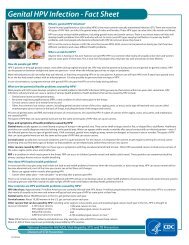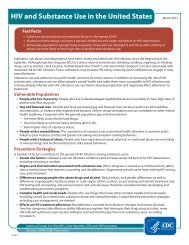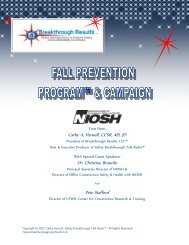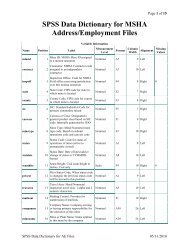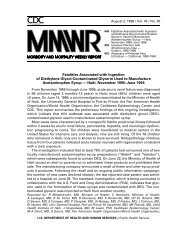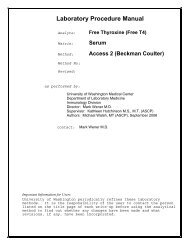Antibiotic Resistance Threats in the United States, 2013 report
Antibiotic Resistance Threats in the United States, 2013 report
Antibiotic Resistance Threats in the United States, 2013 report
You also want an ePaper? Increase the reach of your titles
YUMPU automatically turns print PDFs into web optimized ePapers that Google loves.
ERYTHROMYCIN-RESISTANT<br />
GROUP A STREPTOCOCCUS<br />
FIGHTING THE SPREAD OF RESISTANCE<br />
Encourag<strong>in</strong>g appropriate antibiotic use, <strong>in</strong>clud<strong>in</strong>g us<strong>in</strong>g <strong>the</strong> right antibiotic at <strong>the</strong><br />
right time, and for <strong>the</strong> right amount of time, is crucial to prevent<strong>in</strong>g <strong>the</strong> spread<br />
of drug-resistant GAS. Doctors should adhere to <strong>the</strong> recommended antibiotics for<br />
treat<strong>in</strong>g GAS <strong>in</strong>fections, <strong>in</strong>clud<strong>in</strong>g us<strong>in</strong>g penicill<strong>in</strong> or amoxicill<strong>in</strong> whenever possible.<br />
WHAT CDC IS DOING<br />
CDC has collaborated with <strong>the</strong> Infectious Diseases Society of America to update<br />
guidance on diagnos<strong>in</strong>g strep throat and select<strong>in</strong>g antibiotics to treat it. These<br />
guidel<strong>in</strong>es re<strong>in</strong>force appropriate use of antibiotics for this common illness. CDC<br />
is also promot<strong>in</strong>g appropriate antibiotic use among outpatient healthcare<br />
providers and <strong>the</strong> public through its Get Smart: Know When <strong>Antibiotic</strong>s Work<br />
program. As part of this program, CDC hosts Get Smart About <strong>Antibiotic</strong>s<br />
Week, an annual one-week observance of <strong>the</strong> importance of appropriate<br />
antibiotic use and its impact on antibiotic resistance. Through partnerships<br />
between CDC, state health departments, and universities, CDC is track<strong>in</strong>g GAS<br />
through Active Bacterial Core surveillance (ABCs).<br />
WHAT YOU CAN DO<br />
■■<br />
■■<br />
■■<br />
■■<br />
■■<br />
Prevent <strong>in</strong>fections by practic<strong>in</strong>g good hand hygiene.<br />
Take antibiotics exactly as <strong>the</strong> doctor prescribes. Do not skip<br />
doses. Complete <strong>the</strong> prescribed course of treatment, even<br />
when you start feel<strong>in</strong>g better.<br />
Only take antibiotics prescribed for you. Do not share or use<br />
leftover antibiotics.<br />
Do not save antibiotics for <strong>the</strong> next illness. Discard any leftover medication<br />
once <strong>the</strong> prescribed course of treatment is completed.<br />
Do not ask for antibiotics when your doctor th<strong>in</strong>ks you do not need <strong>the</strong>m.<br />
Rates of resistance to<br />
two core antibiotics<br />
cont<strong>in</strong>ue to <strong>in</strong>crease<br />
for group A strep.<br />
Prevalence of erythromyc<strong>in</strong>, cl<strong>in</strong>damyc<strong>in</strong> and tetracycl<strong>in</strong>e resistance<br />
among group A streptococcal isolates, CDC’s Active Bacterial Core<br />
surveillance (ABCs), 2010–2011<br />
ONLINE RESOURCES<br />
Active Bacterial Core surveillance (ABCs)<br />
http://www.cdc.gov/abcs/<strong>in</strong>dex.html<br />
Get Smart: Know When <strong>Antibiotic</strong>s Work Program<br />
http://www.cdc.gov/getsmart/<br />
Group A Strep<br />
http://www.cdc.gov/ncidod/dbmd/disease<strong>in</strong>fo/groupastreptococcal_g.htm<br />
Necrotiz<strong>in</strong>g Fasciitis<br />
http://www.cdc.gov/features/necrotiz<strong>in</strong>gfasciitis/<br />
Strep Throat<br />
http://www.cdc.gov/features/strepthroat/<br />
Scarlet Fever<br />
http://www.cdc.gov/features/scarletfever/<br />
CS239559-B




